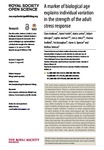A marker of biological age explains individual variation in the strength of the adult stress response.
| dc.contributor.author | Andrews, C | en |
| dc.contributor.author | Nettle, D | en |
| dc.contributor.author | Larriva, M | en |
| dc.contributor.author | Gillespie, R | en |
| dc.contributor.author | Reichert, S | en |
| dc.contributor.author | Brilot, BO | en |
| dc.contributor.author | Bedford, T | en |
| dc.contributor.author | Monaghan, P | en |
| dc.contributor.author | Spencer, KA | en |
| dc.contributor.author | Bateson, M | en |
| dc.date.accessioned | 2017-11-01T11:42:14Z | |
| dc.date.available | 2017-11-01T11:42:14Z | |
| dc.date.issued | 2017-09 | en |
| dc.identifier.issn | 2054-5703 | en |
| dc.identifier.uri | http://hdl.handle.net/10026.1/10125 | |
| dc.description.abstract |
The acute stress response functions to prioritize behavioural and physiological processes that maximize survival in the face of immediate threat. There is variation between individuals in the strength of the adult stress response that is of interest in both evolutionary biology and medicine. Age is an established source of this variation-stress responsiveness diminishes with increasing age in a range of species-but unexplained variation remains. Since individuals of the same chronological age may differ markedly in their pace of biological ageing, we asked whether biological age-measured here via erythrocyte telomere length-predicts variation in stress responsiveness in adult animals of the same chronological age. We studied two cohorts of European starlings in which we had previously manipulated the rate of biological ageing by experimentally altering the competition experienced by chicks in the fortnight following hatching. We predicted that individuals with greater developmental telomere attrition, and hence greater biological age, would show an attenuated corticosterone (CORT) response to an acute stressor when tested as adults. In both cohorts, we found that birds with greater developmental telomere attrition had lower peak CORT levels and a more negative change in CORT levels between 15 and 30 min following stress exposure. Our results, therefore, provide strong evidence that a measure of biological age explains individual variation in stress responsiveness: birds that were biologically older were less stress responsive. Our results provide a novel explanation for the phenomenon of developmental programming of the stress response: observed changes in stress physiology as a result of exposure to early-life adversity may reflect changes in ageing. | en |
| dc.format.extent | 171208 - ? | en |
| dc.language | eng | en |
| dc.language.iso | eng | en |
| dc.subject | Sturnus vulgaris | en |
| dc.subject | biological age | en |
| dc.subject | corticosterone | en |
| dc.subject | early-life adversity | en |
| dc.subject | stress response | en |
| dc.subject | telomere | en |
| dc.title | A marker of biological age explains individual variation in the strength of the adult stress response. | en |
| dc.type | Journal Article | |
| plymouth.author-url | https://www.ncbi.nlm.nih.gov/pubmed/28989794 | en |
| plymouth.issue | 9 | en |
| plymouth.volume | 4 | en |
| plymouth.publication-status | Published online | en |
| plymouth.journal | R Soc Open Sci | en |
| dc.identifier.doi | 10.1098/rsos.171208 | en |
| plymouth.organisational-group | /Plymouth | |
| plymouth.organisational-group | /Plymouth/Faculty of Science and Engineering | |
| plymouth.organisational-group | /Plymouth/REF 2021 Researchers by UoA | |
| plymouth.organisational-group | /Plymouth/REF 2021 Researchers by UoA/UoA04 Psychology, Psychiatry and Neuroscience | |
| dc.publisher.place | England | en |
| dcterms.dateAccepted | 2017-08-31 | en |
| dc.rights.embargoperiod | Not known | en |
| rioxxterms.versionofrecord | 10.1098/rsos.171208 | en |
| rioxxterms.licenseref.uri | http://www.rioxx.net/licenses/all-rights-reserved | en |
| rioxxterms.licenseref.startdate | 2017-09 | en |
| rioxxterms.type | Journal Article/Review | en |


